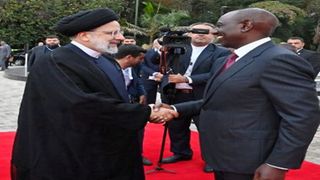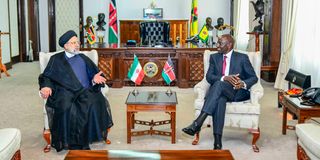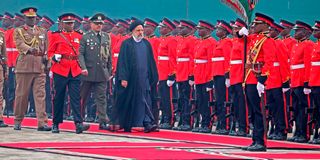
President William Ruto welcomes Iranian President Ebrahim Raisi at State House, Nairobi on Wednesday.
| PCSWeekly Review
Premium
Dancing with the gulf: President Ruto’s newfound love for rich Gulf countries
Iranian President Ebrahim Raisi, accompanied by a big delegation of businessmen from Tehran, last week visited Nairobi where they signed bilateral agreements with President William Ruto.
Even though the details of what transpired in the meetings with Ruto were worded in diplomatic speak, it is an open secret that Tehran’s interest is to expand influence globally and to fight sanctions and isolation.
What are Kenya’s economic interests and what does that high-profile visit to Nairobi by the Iranian leader mean for our diplomatic relations with the United States, Israel and other nations that have a growing stand-off with Iran over its nuclear programme?
When a country with whom you are closely diplomatically engaged is in bad books with the West, are you also exposed? These are pertinent questions in the minds of pundits as they struggle to discern conduct and direction for policy under President Ruto.

President William Ruto with Iranian President Ebrahim Raisi during the State Visit at State House, Nairobi, on July 12, 2023.
On paper, trade volumes between Kenya and Iran are not significant. Kenya regards Iran as one of the most valued destinations for its tea, with exports worth US$28.4 million in the first quarter of this year, an eight-fold increase from sales in the same period last year. Still, the impact of warming relations with Tehran can only be significant for Kenya depending on capacity to ramp up export capacity, which only helps where there is room for significant trade-offs. Ruto announced that the Iranians plan to build a motor vehicle assembly plant in Mombasa.
Diplomatic relations
President Ruto would appear to be keen on ramping up economic and diplomatic relations with the rich Gulf countries. The fact that the visit by the Iranian leader coincided with another high-profile visit to Nairobi by one of the largest trade delegations from Saudi Arabia was not without significance.
Middle East Gulf States are diversifying their economies from dependence on oil exports to areas such as financial services, port and railway concessions and construction of world-class airports.
It was significant that, against the background of President Ruto’s high-level diplomatic engagement with two key Gulf states, the National Treasury also announced that it was planning to issue a ‘sukuk’ – an Islamic sovereign bond – to support plans to refinance mounting debt repayment obligations.
With access to mainstream international capital markets proving to be increasingly challenging for Kenya, it seems that the Treasury is plotting to take advantage of the high-profile diplomatic offensive President Ruto’s administration has rolled out to the Gulf region. It is in the financial sector where the interests of Gulf countries has been most evident in recent years. The Qataris have for many years been keen on building a proposed Nairobi International Financial Centre.
As far back as April 2014, Qatar National Bank (QNB) tabled a request to the government to buy a local bank – their preference – a large institution with a regional footprint. But what has intrigued observers most is the fact that QNB has recently adopted the practice of regularly publishing its audited accounts in local newspapers.
The largest bank in the Middle East and northern Africa region, with a whopping $140 billion (Sh14.2 trillion) in assets, its move confounded many observers because banks only publish financial statements in markets where they are licensed to offer banking services. Pundits in Nairobi’s financial sector read the gimmicks as teasers put out by QNB for an impending big acquisition in the local market.

Iranian President Ebrahim Raisi inspects a guard of honour at State House, Nairobi, on July 12, 2023.
When Kenya floated the Eurobond in 2014, QNB Capital placed a bid of $200 million (Sh20.4 billion) – a strong indicator of the level of interest and confidence by the markets of Gulf countries in Kenya paper.
Trends suggest that large and rich financial institutions from the Gulf are quickly positioning themselves as the entities ready to provide resources to African countries locked out from the international debt markets and are, unlike conventional debt markets, ready to lend to Africa without attaching too many conditions. Financial institutions and markets of the Gulf region are morphing into sanctions busters in a western-dominated international financial system.
Lappset projects
At the Coast, investors from the Gulf have been very keen on the Port of Lamu. The Al Bader Group, an investment owned and operated by a network of high net worth individuals out of Kuwait and the UAE, expressed interest in financing and developing some of the Lappset projects, including the Lamu Port, several years ago.
Last year, former Treasury Cabinet Secretary Njuguna Ndung’u unsuccessfully offered to gift the Lamu Port concession to DP World of UAE. In 2015, the administration of former President Uhuru Kenyatta signed a bilateral deal with the government of the UAE, offering to grant a concession of managing Mombasa’s Second Container Terminal to DP World. The deal did not go through. When Ruto’s administration finally puts out the tender for concessioning of the Lamu Port, competition from port operators from the Gulf will be stiff.
Diplomatic relations between Kenya and Gulf have been a hot and cold affair for many years over security issues.
But an important factor in the persistently cordial relations between Tehran and Nairobi over the years is the presence, mainly in areas around Mombasa, of an influential network of Shia community members that engages in high-profile philanthropy building of mosques, local schools, health and prayer centres.
President Ruto announced on Wednesday that Iranian investors had committed to building a local vehicle assembly plant in the coastal town that will be producing a brand to be known as Kifaru.




